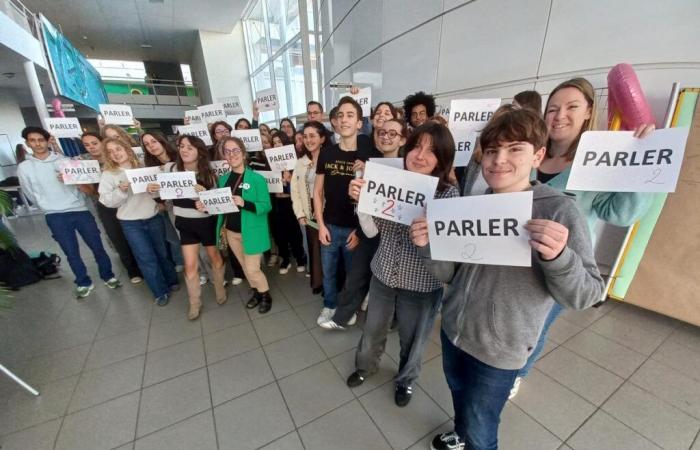Qhen the “simple” teasing stops, where does the “harassment” begin? In a school environment, from a very young age, children bicker, argue, make fun. Beyond the limits, sometimes. “Statistics show that one student per class is a victim of harassment,” recalls Marilyn Noyel. “At the scale of a high school like Cordouan, around fifty young people are potentially victims of school bullying,” assesses the documentary professor empirically.
“Each year, generally, we are confronted with around twenty situations of harassment,” adds Jean-Louis Mangion. The principal education advisor (CPE) has been involved in the prevention of school bullying for more than ten years. Within the Royan general education high school itself, Jean-Louis Mangion formed successive groups of students, relaying information to their classmates and, above all, from their suffering comrades to the adult community of the establishment.
Melyna shares her experience as a victim
These “sentinels” have become “ambassadors against harassment” in the term of National Education. These volunteers within their class – girls and boys of all levels, from Second to Terminale – number 65 this year at Cordouan high school. Often former victims. Not always. “These ambassadors are very important relays for us adults. They help us identify problematic situations. »
“When I was bullied, I pretended I was sick to avoid school. »
This Thursday, November 7, three of these “ambassadors against harassment” from Cordouan high school exceptionally exported their experience and their knowledge of the phenomenon. Cassandra, Melyna and Cristiano spoke in front of 90 students from the Jean-Zay school, in Saint-Georges-de-Didonne.
Melyna, 15, is just entering high school. “I suffered harassment for ten years. » The teenager knows how to recognize the signals that should alert a friend who is a little observant… or aware. “A student who no longer wants to work, who comes to school with a lump in his stomach, who remains alone, isolated… Parents also may not see certain signals. When I was harassed, I often made people believe that I was sick so as not to go to school. »
A method that works
Thanks in particular to the benevolent vigilance of the “ambassadors”, Jean-Louis Mangion assures, each reported case is taken seriously and “very quickly managed. And the situation stops! “. The victim, the alleged perpetrator and any witnesses are interviewed in the days following a report. Jean-Louis Mangion praises the effectiveness of a new support protocol generalized by National Education: “PHARe”, Program to combat harassment at school. Eight adults from the establishment – CPE, nurse, documentarian and other teachers – were particularly trained, constituting a “resource team” for the rest of the high school community.
“In particular, we learned the method of shared concern. In summary, we do not judge the victim, we do not blame the perpetrator. With this method, we ask the harasser to help his victim get better. » During the first interview, which is very short, the adult does not even inform the harasser that he is being criticized for his behavior, but that one of his classmates has problems and that he is expected to he checks to see if anything happens to him at the moment. The stalker is stuck by his duty… to protect his victim.
More blunders
In the fight against harassment, in schools as elsewhere, the road is long. It is even infinite. “Harassment will always exist, but we will reduce it,” defends Jean-Louis Mangion. The principal education advisor is delighted to see developments among young people on the subject. “Many of our students have realized that we can no longer accept certain things and come to tell us. We are receiving more and more reports of online harassment problems, because young people themselves no longer support certain lynchings, truly, on social networks. »
Then you need to know how to intervene. “Some fellow teachers sometimes take somewhat unfortunate initiatives, by confronting victim and perpetrator or talking about the situation in front of the class. They want to do well, but it can be counterproductive. It is important to know how to approach a situation,” insists documentary professor Marilyn Noyel.
Vigilant from school
“It’s not because we’re small that we have small problems,” Jean-Louis Mangion likes to say to elementary school children. Three “ambassadors against harassment” from the Cordouan high school will extend their meeting, this Thursday, November 7, with the schoolchildren of Saint-Georges-de-Didonne by training some of them so that they become the first “little ambassadors” in the country. Royannais. In turn, they will have to be attentive to their classmates and be their relay to the teachers.






